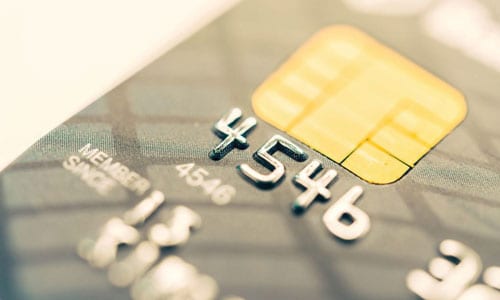Building Good Credit

How To Build Good Credit
As you transition from college to the real world, your credit score will become more and more important, especially as you get ready to set up bills and make big purchases like cars and a home. But building credit doesn’t have to be difficult or painful.
Pay Your Bills On Time
This may seem obvious, but your credit will take a ding if you don’t pay bills like power, phone, car, and student loans on time. Budget accordingly so you have enough after every paycheck. Set up automatic bill payments through your checking account so you don’t miss any payments.
Use Credit Cards Wisely
It’s very tempting to use your credit cards when you want something, but don’t let your credit usage get out of hand. Balances can buildup quickly and that could lead to a late payment, which you really don’t want. Limit the number of cards you have and make sure you pay on time and pay off balances. Making regular payments and keeping balances low will help you build your credit smartly.
Start Small And Build
Your credit union may have a better rate for your credit card, so start there, or get a secured card – where you make a deposit and it becomes your credit line. Get a lower credit limit so you’re not tempted to over-borrow. When you get into a habit of paying on time, you can build your limit to match your earnings and needs.
Be smart with your credit and it will build with you. Make sure to get your annual free credit report to track your progress.
Pull Your Credit Report Every Year

Did you know that you can pull your credit score for free from each credit reporting company once a year? This is something every young consumer should do to keep informed about their credit status, and the top of the year is a great reminder to check. The one government-authorized site to do this is www.annualcreditreport.com.
Try not to be tempted by advertising campaigns to pull your “free credit report” from other sites. Those ads usually tout websites owned by one of the three big credit bureaus – Equifax, Experian, and TransUnion. While they may allow you to pull a free report from that one credit bureau, they may also try to sell you products and services you may not need or want.
Reviewing your credit report is extremely important. Once you have your report in your hand, verify that all of the content of the report is accurate, from your personal information to your list of creditors. If you spot any errors, please follow the credit bureau’s instructions for investigating and updating inaccurate information. An investigation and subsequent file correction can take up to 90days to complete, so you may have to be patient. You can speed up the correction process if you have documentation from a creditor showing accurate payment history or balance information.
Credit Cards – Pros vs. Cons

It’s nearly impossible to get through life without a credit card nowadays. Whether you want to purchase concert tickets online or just need to fill your gas tank and you’re in a hurry, plastic is the way to go.
However, choosing between paying cash/using your debit card and using credit can be tricky. It is often tempting to just “throw that purchase on a credit card” and worry about paying for it later.
But that can get you into trouble quickly. Let’s think about some of the pros and cons associated with choosing a credit card over cash or your debit option:
| Pros | Cons |
|---|---|
| Low-limit credit cards are usually easy to get (you may need a cosigner if you haven’t already established credit somehow) | It can be tempting to spend up to your credit limit if you aren’t careful |
| Worry about paying off the bill later | You must be careful not to miss your credit card bill’s deadline |
| By using your credit card and paying it off in a timely manner, you start building a good credit history | Having available credit can lead to impulse spending, so only purchase what you can afford to pay off |
| There are lower or no fees associated with credit union credit cards | Other card lenders may charge fees for a variety of transactions, so always read the fine print |
| Credit cards give you immediate access to credit | Credit cards give you immediate access to credit – yes, it’s both good and bad! |
| You may earn rewards on purchases | Sometimes first-time credit card holders aren’t eligible for rewards on low-limit cards |
Keep Your Credit On The Up And Up
The best way to start on the fast track to building a solid credit history is to apply for a low-limit credit card – and to pay off the balance on the card each month. This way you won’t be sitting with a pile of debt and no end in sight (which is incredibly stressful, as you may have already learned).
Having good credit ensures you get the lowest loan rates, which means you will spend less on things like a house and a car if you have to borrow in the future!
Getting Out Of Credit Card Debt

Since getting into credit card debt is so easy, it doesn’t seem fair that getting out of it is so hard! However, if you stay focused and work at it, it is possible to get out of credit card trouble. Follow these steps and you’ll be well on your way!
Evaluate What You Owe – When you sit down and look at the reality of the situation, you can create a game plan to get out of it. If you go around paying the minimums on your credit card account balances, you’re only ignoring a problem that will lurk around for years until you address it. Figure out what you owe and create a budget to pay it off. Bankrate.com has many calculators you can use to set up different payoff game plans.
Check Your Credit Score – If your credit score is below 660, you need to work at improving it, so you can qualify for better rates on credit cards. By paying down debt and making payments on time, you’ll take some important steps toward raising your score. If you lock in a better card and a good balance transfer rate, you can often cut your interest rate in half or more. This will help tremendously since it will allow you to pay off the balance even faster.
Get A Better Credit Card Deal – Head to your credit union where they will work with you to get the best deal possible. Especially if you’ve taken the time to improve your credit score, you’ll have a good chance of getting a good rate. Explain the situation to your credit union and they will be able to work with you to find the right card for your particular situation.
Managing Your Credit At College

Do you want a credit card? Okay. Get one, but know that having a credit card is a huge financial responsibility. The approach to managing it must be planned, intelligent and educated; after all, many students rack up hundreds – if not thousands – of dollars in debt while in college. Avoiding this financial pitfall is key! So how can you use your credit card wisely?
The first thing to consider is the reason you wanted a credit card. Did you apply for a credit card to establish and build credit? Did you apply so you could use it for emergencies or education expenses? Whatever the reason, be sure it is well-known and respected (by you) through the life of the credit card. One slip-up on those new sneakers or that great jacket could lead to more money mistakes and get you into trouble. Remember, when you use a credit card, you aren’t borrowing money from your parents; the cash is owed – possibly with interest – to a financial institution.
The next thing to think about is your monthly spending. Most likely you will want to keep your credit card bill below a certain amount so you are sure to be able to pay the amount in full each month. You also want to be aware of your limit and ensure you aren’t overspending, so you don’t get hit with over-the-limit fees. You should also keep your spending to around 50 percent of your credit limit or less (this means you should only spend up to 50 percent of your limit so your available credit will be the same or more than your balance).
Think about repayment options. It makes sense to pay the balance of your card in full each month. If you have to carry a revolving balance, think about paying the minimum twice a month to reduce the amount of interest the balance will carry. Also, keep in mind your interest rate and know that if you only pay the minimum each month, it could take quite a while to repay and your repayment amount could end up being much more than how much you actually spent.
Finally, keep track of your credit and check your credit report once a year. When you apply for a free credit report, you can keep tabs on your performance and ensure there aren’t any mistakes on your report. Mistakes can lead to future issues when applying for loans, buying a car or even getting a job.
These steps, if followed correctly, can lead to a healthy financial track record and keep you on point for spending wisely!
